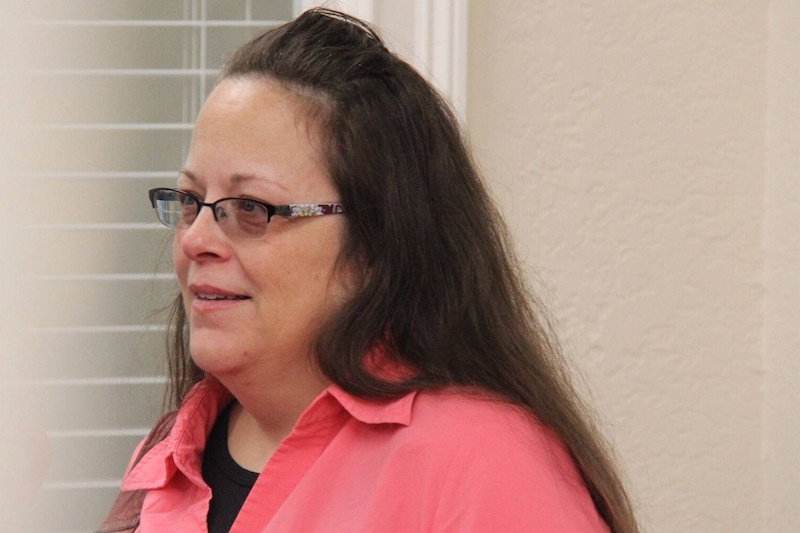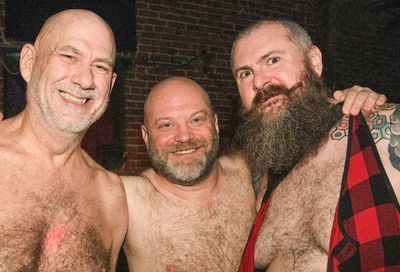Supreme Court rules Civil Rights Act protects LGBTQ people from discrimination
High court finds Title VII's prohibitions on sex-based employment discrimination apply to LGBTQ people

On Monday, in a landmark decision bound to have wide-ranging ramifications, the U.S. Supreme Court ruled that federal law prohibits employment discrimination against people on the basis of their sexual orientation or gender identity.
Weighing in on two cases, the high court found that Title VII of the Civil Rights Act of 1964, which prohibits sex-based discrimination in employment, also applies to LGBTQ individuals who have been fired, or denied employment opportunities, or denied promotions because of their sexual orientation, their gender identity, their real or perceived deviance from traditional gender roles, or their failure to adhere to traditional sex-based stereotypes.
In a 6-3 decision, the court upheld two lower court rulings. The first, from the 2nd U.S. Circuit Court of Appeals, had found that a skydiving company had illegally discriminated against Donald Zarda, an openly gay skydiving instructor, when it fired him who was allegedly fired after a client found out he was gay and complained to his supervisors.
The second, from the 6th Circuit Court of Appeals, found that the Aimee Stephens, a transgender woman, was wrongly terminated after she decided to transition while working for a Harris Funeral Homes, a Michigan funeral home chain. Both Zarda and Stephens have since passed away.
By upholding the ruling in the Zarda case, the court also overruled a 2018 decision by the 11th U.S. Circuit Court of Appeals not to hear a lawsuit brought by Gerald Bostock, a former child welfare services coordinator for Clayton County, Ga., who alleged that his supervisors fired him for “conduct unbecoming” a county employee after learning that he was playing in a gay recreational softball league outside of work.
In 2017, the 11th Circuit refused to hear a similar lawsuit brought by Jameka Evans, a lesbian security guard who alleged she was forced to leave her job because of continued harassment at the hands of superiors and co-workers due to her sexual orientation and her failure to adhere to traditional notions of femininity. However, the Supreme Court ultimately decided not to hear that case.
Currently, 21 states have their own laws prohibiting job discrimination based on sexual orientation or gender identity. But Monday’s ruling means that similar protections exist in federal law, meaning that LGBTQ individuals who believe they have been discriminated against will be able to seek redress for wrongful firings or mistreatment on the job.
Both LGBTQ advocates and opponents acknowledged that, when the Civil Rights Act of 1964 was passed, its authors had understood “sex” as meaning the biological difference between males and females, based on their assigned sex at birth. However, lawyers representing Bostock, Zarda, and Stephens argued that the law should also apply to instances where a person is discriminated against because of their sexual orientation or gender identity.
In the cases involving sexual orientation, they argued that Bostock and Zarda would not have been fired had they been women attracted to men, thus making their sex the crucial factor that influenced their firing.
In Stephens’ case, her lawyers argued that her firing — after she informed her employer, Thomas Rost, that she intended to dress in women’s clothing, consistent with her gender identity — was motivated by the fact that her assigned sex at birth differed from her gender presentation, and ran contrary to Rost’s beliefs on traditional gender norms.
Writing for the court, Justice Neil Gorsuch concurred with those arguments advanced by the plaintiffs, finding that discrimination based on a person’s homosexuality or transgender status necessarily requires an employer to consider the person’s sex and make a conscious decision to treat them differently as a result, thereby violating Title VII.
“From the ordinary public meaning of the statute’s language at the time of the law’s adoption, a straightforward rule emerges: An employer violates Title VII when it intentionally fires an individual employee based in part on sex. It doesn’t matter if other factors besides the plaintiff’s sex contributed to the decision. And it doesn’t matter if the employer treated women as a group the same when compared to men as a group,” he wrote. “If the employer intentionally relies in part on an individual employee’s sex when deciding to discharge the employee — put differently, if changing the employee’s sex would have yielded a different choice by the employer — a statutory violation has occurred.”
Gorsuch added: “The statute’s message for our cases is equally simply and momentous: An individual’s homosexuality or transgender status is not relevant to employment decisions. That’s because it is impossible to discriminate against a person for being homosexual or transgender without discriminating against that individual based on sex.”
Gorsuch gave an example of an employer with two employees, both of whom are attracted to men.
“The two individuals are, to the employer’s mind, materially identical in all respects, except that one is a man and the other a woman,” he wrote. “If the employer fires the male employee for no reason other than the fact he is attracted to men, the employer discriminates against him for traits or actions it tolerates in his female colleague. Put differently, the employer intentionally singles out an employee to fire based in part on the employees sex, and the affected employee’s sex is a butfor cause of the discharge.”
He continued: “[Take] an employer who fires a transgender person who was identified as male at birth but who now identifies as female. If the employer retains an otherwise identical employee who identified as female at birth, the employer intentionally penalizes a person identified as male at birth for traits or actions that it tolerates in an employee identified as female at birth. Again, the individual employee’s sex plays an unmistakable and impermissible role in the discharge decision.”
Gorsuch was joined in his opinion by Chief Justice John Roberts and Justices Elena Kagan, Ruth Bader Ginsburg, Stephen Breyer, and Sonia Sotomayor.
“There are truly no words to describe just how elated I am,” Bostock said in a statement. “When I was fired seven years ago, I was devastated. But this fight became about so much more than me. I am sincerely grateful to the Supreme Court, my attorneys, advocacy organizations like GLAAD, and every person who supported me on this journey. Today, we can go to work without the fear of being fired for who we are and who we love. Yet, there is more work to be done. Discrimination has no place in this world, and I will not rest until we have equal rights for all.”
LGBTQ advocacy groups were similarly elated by the ruling. In a statement, Kevin Jennings, the CEO of Lambda Legal, said, “Finally. Today, the law, justice and fairness are on our side. Our nation’s highest court confirmed what Lambda Legal has argued for years, that discrimination against LGBTQ workers is illegal.”
Lambda Legal has argued for years that discrimination based on a person’s sexual orientation or gender identity constitutes sex discrimination, having successfully argued the Zarda case before the 2nd Circuit. They also obtained a successful ruling in 2017 from the 7th U.S. Circuit Court of Appeals on behalf of Kim Hively, an adjunct professor at Ivy Tech Community College, in South Bend, Ind., who claimed she was denied a full-time teaching position, and ultimately fired, after her superiors discovered she was a lesbian. The college later decided to settle the case, which is why that decision was never appealed to the Supreme Court.
“It is incredibly gratifying to have the Supreme Court confirm what Lambda Legal and others have been arguing for years — federal sex discrimination laws protect against discrimination on the basis of a person’s sexual orientation or gender identity,” Gregory Nevins, senior counsel and the director of Lambda Legal’s Employment Fairness Project, said in a statement. “Every LGBTQ worker deserves the protections that our country’s federal law provides by its plain terms, and we are thrilled that today the Court agreed.”
The National LGBTQ Task Force hailed the high court’s decision as a “watershed moment” for LGBTQ rights in the United States.
“At this most challenging time for our community, the country and the world, it is heartening to see the Court decision bolstering fairness and equality in this country by affirming that LGBTQ+ people are protected from employment discrimination under federal law,” Rea Carey, the executive director of the Task Force, said in a statement. “Every person celebrating this ruling has decades of work by Black and Brown trans members of our community, in particular, to thank for the ability to work free from discrimination.
“And while this is a watershed moment for fairness and equality our struggle for LGBTQ liberation, we still have work to do,” Carey added. “We must close critical gaps in nondiscrimination protections. For example, it is still legal to discriminate against LGBTQ+ people in federally funded programs, including hospitals, colleges, and adoption agencies as well as discriminate against LGBTQ+, women, and others in public accommodations, including hotels and restaurants. It is critical that Congress join with the Supreme Court and the overwhelming majority of Americans to pass full federal non-discrimination protections for LGBTQ+ people.”
The LGBTQ media advocacy organization GLAAD also praised the court’s decision.
“The Supreme Court’s historic decision affirms what shouldn’t have even been a debate: LGBTQ Americans should be able to work without fear of losing jobs because of who they are,” Sarah Kate Ellis, the president and CEO of GLAAD, said in a statement. “The decision gives us hope that as a country we can unite for the common good and continue the fight for LGBTQ acceptance. Especially at a time when the Trump Administration is rolling back the rights of transgender people and anti-transgender violence continues to plague our nation, this decision is a step towards affirming the dignity of transgender people, and all LGBTQ people.”
The Rev. Jasmine Beach-Ferrara, the executive director of the Campaign for Southern Equality, noted that the ruling is particularly significant for the estimated 5 million LGBTQ Americans who live in Southern states. Currently, Virginia is the only Southern state with LGBTQ-inclusive nondiscrimination protections.
“The ruling ensures a blanket of employment protections for LGBTQ people rather than the inadequate patchwork that has all but stopped at the borders of Southern states,” Beach-Ferrara said in a statement. “For LGBTQ Southerners, the decision shows yet again that no one should face discrimination because of who they are or who they love.
“While we’re grateful for this step forward, we all must remain committed to this month’s deepened and long overdue conversation around racial injustice. We lift up the reality that Southerners with multiple marginalized identities face multiple layers of oppression,” Beach-Ferrara added. “Black LGBTQ Southerners, for example, not only confront employment discrimination but also police brutality, anti-Black racism, and disproportionate rates of living with HIV. As we celebrate today’s ruling, we must continue to push for dignity, respect, and justice for all LGBTQ people in every sphere of life.”
Justin Nelson and Chance Mitchell, the co-founders LGBTQ pro-business chamber NGLCC, and Out Leadership CEO and founder Todd Sears issued a joint statement saying the organizations were “elated the Supreme Court has ensured a state-sanctioned license to discriminate will not be issued in this country’s workplaces” and vowing that the business community “will continue to be the catalyst for positive change for America’s diverse and marginalized communities.”
“The LGBT community is a vital part of the American economy and deserves equal treatment under the law. The NGLCC and Out Leadership will continue to advocate for our community’s right to live their lives free from discrimination in their places of business and in their local communities, which this decision now affirms,” the statement reads. “This decision is a step forward for LGBT rights in the United States, and reminds all of us that the protections for other minority groups, including people of color, the differently-abled, and women, must also be upheld and strengthened.”
Mara Keisling, the executive director of the National Center for Transgender Equality, called the late Stephens a “hero” for her willingness to stand up for herself and pursue legal action against her employer.
“The Supreme Court’s decision provides the nation with great news during a time when it is sorely needed. To hear the highest court in the land say LGBTQ people are, and should be, protected from discrimination under federal law is a historic moment,” Keisling said in a statement. “Aimee Stephens, Don Zarda and Gerald Bostock will have a place in the history books as people who stood up against discrimination and paved the way for groups historically excluded from legal protection.”
Several LGBTQ and allied groups noted that the next logical step for LGBTQ rights would be to pass legislation like the Equality Act, which would permanently enshrine LGBTQ protections in employment, housing, and public accommodations — as well as other areas — in Title VII of the Civil Rights Act.
“This is a landmark victory for LGBTQ equality,” HRC President Alphonso David said in a statement. “No one should be denied a job or fired simply because of who they are or whom they love. For the past two decades, federal courts have determined that discrimination on the basis of LGBTQ status is unlawful discrimination under federal law.
“Today’s historic ruling by the Supreme Court affirms that view, but there is still work left to be done,” he added. “In many aspects of the public square, LGBTQ people still lack non-discrimination protections, which is why it is crucial that Congress pass the Equality Act to address the significant gaps in federal civil rights laws and improve protections for everyone.”
“At a time when our fundamental values as a country are under attack, this decision affirms the basic belief that civil rights belong to us all,” Vanita Gupta, the president and CEO of The Leadership Conference on Civil and Human Rights, said in a statement. “We commend the Supreme Court’s decision to affirm that LGBTQ people are, and should be, protected from workplace discrimination under federal law. … We know, however, that our fight to protect LGBTQ people must go on. There are still numerous gaps in our nation’s anti-discrimination laws, and Congress must act now to pass full federal anti-discrimination protection laws, like the Equality Act, for all people.”
U.S. House Speaker Nancy Pelosi hailed the high court’s decision as “momentous,” but also trained her fire on President Donald Trump and Senate Majority Leader Mitch McConnell (R-Ky.) for their opposition to the Equality Act, which the Democratic-controlled House overwhelmingly approved last year.
“Today, the Supreme Court has unequivocally affirmed that all Americans, regardless of who you are or whom you love, are protected from discrimination in the workplace under federal law. This momentous decision is a victory for the LGBTQ community, for our democracy and for our fundamental values of equality and justice for all,” Pelosi said. “Yet, the Trump Administration continues to advance an outrageous, hateful anti-LGBTQ agenda that risks the health and well-being of countless LGBTQ Americans and their families. And in too many places, LGBTQ individuals face continued persecution, harassment and violence, particularly trans women of color who face a disproportionately high rate of homelessness, HIV, sexual assault and murder.
“To finally and fully end LGBTQ discrimination, not just in the workplace, but in every place, last year, House Democrats passed the landmark Equality Act,” she continued. “Now, Leader McConnell must end his partisan obstruction and allow the Senate to vote on this critical legislation.”
Despite widespread praise for the ruling, several conservative groups decried the Supreme Court’s decision as judicial activism on the part of the majority.
“The Supreme Court undermined the rule of law today. In expanding the ban of sex discrimination in the Civil Rights Act of 1964 to include sexual orientation and gender identity, the court engaged in an abuse of power by legislating from the bench,” Tom Fitton, the president of the right-wing group Judicial Watch said in a statement. “There has been a years-long battle by Left to change federal law to bar discrimination based on sexual orientation and gender identity. But Supreme Court today short-circuited the democratic process and rewrote the law without a vote of Congress but by a vote of six unelected judges.”
Fitton urged Congress to take future action to “combat this judicial power grab” by explicitly passing legislation to define “sex” as pertaining only to a person’s fixed, immutable, biological sex at birth.
“Today’s radical Supreme Court decision shows that the threat to the rule of law doesn’t only come from leftist rioters in the streets, but also from judicial activists on the bench,” he said, citing Justice Samuel Alito’s dissent in the case. “As Justice Alito warns, today’s decision, unless fixed by Congress, could destroy women’s sports, weaken religious freedom and free speech, weaken personal privacy, and cause chaos in schools.”
The anti-LGBTQ legal firm Liberty Counsel also decried the ruling, saying the ruling would have far-reaching implications, particularly with regard to transgender inclusion in sports and public accommodations — two arguments that social conservatives have deployed to cast transgender and nonbinary individuals as threats to cisgender individuals.
“A plain reading of federal employment law is clear that it refers to biological male and female. The original intent and meaning of the law is clear, and the common sense reading of ‘sex’ as male and female is made even more obvious by Congress repeatedly refusing to amend the law,” Liberty Counsel Chairman and founder Mat Staver said in a statement. “When Congress refuses to amend its own law, courts have no authority to rewrite the law. Yet, that is what the majority of the Supreme Court did today.”
Staver also noted that, in his opinion, Gorsuch opened the door to a potential defense for churches and religious organizations under the First Amendment and the federal Religious Freedom Restoration Act.
“The reverberations [of this decision] will involve questions such as whether churches and religious organizations will be exempted from applying this decision in their employment decisions,” Staver said. “While churches and religious organizations are not exempt from employment discrimination under Title VII based on sex discrimination, the Supreme Court unanimously upheld the ‘ministerial exemption’ for a church when it terminated a person who otherwise was covered under the Americans with Disabilities Act.
[bookshelf id=’2′]
“The majority opinion specifically states that religious employers may raise two claims not raised in this case — the First Amendment ‘ministerial exemption’ and the broader defense under the federal Religious Freedom Restoration Act. In this respect, it is worth repeating what the Court said: ‘RFRA operates as a kind of super statute, displacing the normal operation of other federal laws, it might supersede Title VII’s commands in appropriate case.’ Since there was no dissent from this section, the discussion regarding RFRA may have unanimous support from all nine Justices. Even though Harris Funeral Homes raised RFRA below, it failed to present that question before the Supreme Court.”
But Katy Joseph, the director of policy and advocacy at the Interfaith Alliance, disagreed with Staver’s contention that RFRA can be used as a defense, noting Rost had initially tried to justify his firing of Stephens by citing his religious beliefs opposing homosexuality and transgenderism.
“Today, the court affirmed an inherent truth, holding that LGBTQ+ people are, and should be, protected from discrimination under federal law. In this challenging moment for our nation, the Supreme Court has delivered a watershed moment for equality. Every person, of all sexual orientations and gender identities, has inherent dignity and worth,” Joseph said in a statement.
“Too often employers overstep the boundaries of personal religious freedom — the right to believe as we choose — to impose their beliefs on others through staffing decisions and workplace culture. Turning away LGBTQ+ job applicants and employees, or terminating their employment due to their identity, isn’t religious freedom — it’s discrimination.”
Read more:
Global Pride to focus on racial justice, uplift Black Lives Matter movement, on June 27
Capital Pride, The DC Center, and other LGBTQ orgs to hold educational forum on defunding police
Ohio trans woman Riah Milton shot to death in alleged robbery
Support Metro Weekly’s Journalism
These are challenging times for news organizations. And yet it’s crucial we stay active and provide vital resources and information to both our local readers and the world. So won’t you please take a moment and consider supporting Metro Weekly with a membership? For as little as $5 a month, you can help ensure Metro Weekly magazine and MetroWeekly.com remain free, viable resources as we provide the best, most diverse, culturally-resonant LGBTQ coverage in both the D.C. region and around the world. Memberships come with exclusive perks and discounts, your own personal digital delivery of each week’s magazine (and an archive), access to our Member's Lounge when it launches this fall, and exclusive members-only items like Metro Weekly Membership Mugs and Tote Bags! Check out all our membership levels here and please join us today!



























You must be logged in to post a comment.